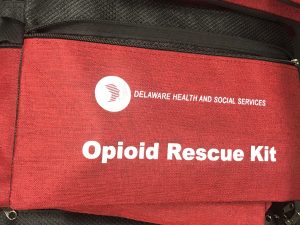DOVER, DE (Jan. 3, 2023) – Through the Centers for Disease Control and Prevention’s State Unintentional Drug Overdose Reporting System (SUDORS), Delaware was recently among 47 states to contribute data to the CDC’s Dec. 16, 2022, Morbidity and Mortality Weekly Report, titled “Drug Overdose Deaths Among Persons Aged 10-19 Years – United States, July 2019-December 2021.” The Division of Public Health (DPH) utilizes SUDORS to track available trends and characteristics of drug overdose deaths and inform prevention and response efforts.
Although middle school and high school aged youth in the U.S. reported using fewer illicit drugs in 2020, there was a 94% increase in overdose deaths from 2019 to 2020 among this age group and a 20% increase from 2020 to 2021, according to the CDC report. From July-December 2019 to July-December 2021, the median monthly overdose deaths increased 109%. Despite reporting less illicit drug use among this population overall, the CDC points to the potency of the drugs as a major contributing factor to the increase in overdose deaths among youth. During the same time period, deaths involving illicitly manufactured fentanyl increased 182%. Approximately 90% of overdose deaths involved opioids, and 83.9% involved illicit manufactured fentanyl.
Most youth who overdosed had no prior opioid use history, according to the CDC. Approximately a quarter of the deaths included evidence of counterfeit pills. However, this data may be underreported. The United States Drug Enforcement Administration has documented counterfeit pills laced with fentanyl being sold to youth through social media. DPH has responded with an educational fentanyl campaign targeted to youth stating, “If you get your drugs from a DM and not a doctor, odds are they’re laced with fentanyl.” This campaign is running on various social media platforms.
Additionally, two-thirds of decedents had a potential bystander present, although most provided no overdose response. It is important that family and friends recognize the warning signs of drug use and respond quickly to an overdose. The CDC states that parents should monitor adolescent behavior. DPH and the Division of Substance Abuse and Mental Health developed the toolkit, Talk2Kids About Drugs, which is available on HelpIsHereDE.com. This toolkit has resources for parents and educators on how to talk to kids about drugs and alcohol. In addition, DPH has worked with the Department of Education on new health modules for high schoolers on drug prevention and education. However, more opportunities for opioid response including Narcan administration training for parents, staff, and youth ages 14 and older is needed so that Narcan is readily available.
The CDC states that roughly 41% of decedents had a history of a mental health condition or treatment for substance use disorder. It is important that the community supports youth by implementing programs to prevent adverse childhood experiences. The Division of Public Health created the #MyReasonWhyDE campaign so that youth can promote their reason to remain drug free and embrace a resilient mind frame. However, if youth are struggling with their mental health or substance use disorder, there are resources available on HelpIsHereDE for immediate treatment in person, by phone or text, or online. Crisis intervention services for children under 18 are available 24/7 for parents and caregivers at 800-969-4357 or by texting DE to 741-741.
If you or a loved one is struggling with addiction in Delaware, call the DHSS 24/7 Crisis Hotline to be connected to treatment and recovery options. In New Castle County, call 1-800-652-2929. Or in Kent and Sussex counties, call 1-800-345-6785. For free 24/7 counseling, coaching, and support, as well as links to mental health, addiction, and crisis services call the Delaware Hope Line at 1-833-9-HOPEDE. To search for treatment and recovery services in Delaware or nearby states, visit HelpIsHereDE.com.
###
The Delaware Division of Public Health (DPH), a division of the Delaware Department of Health and Social Services, is a nationally accredited public health agency recognized by the Public Health Accreditation Board for its outstanding dedication to driving change through innovation. DPH is committed to improving the quality of the lives of Delaware’s citizens by promoting health and well-being, fostering self-sufficiency, and protecting vulnerable populations.
Anyone who is deaf, hard of hearing, Deaf-Blind, or speech-disabled can contact DPH by first dialing 711 using specialized devices (i.e., TTY, TeleBraille, voice devices). The 711 service is free; to learn more about how it works, visit delawarerelay.com.
